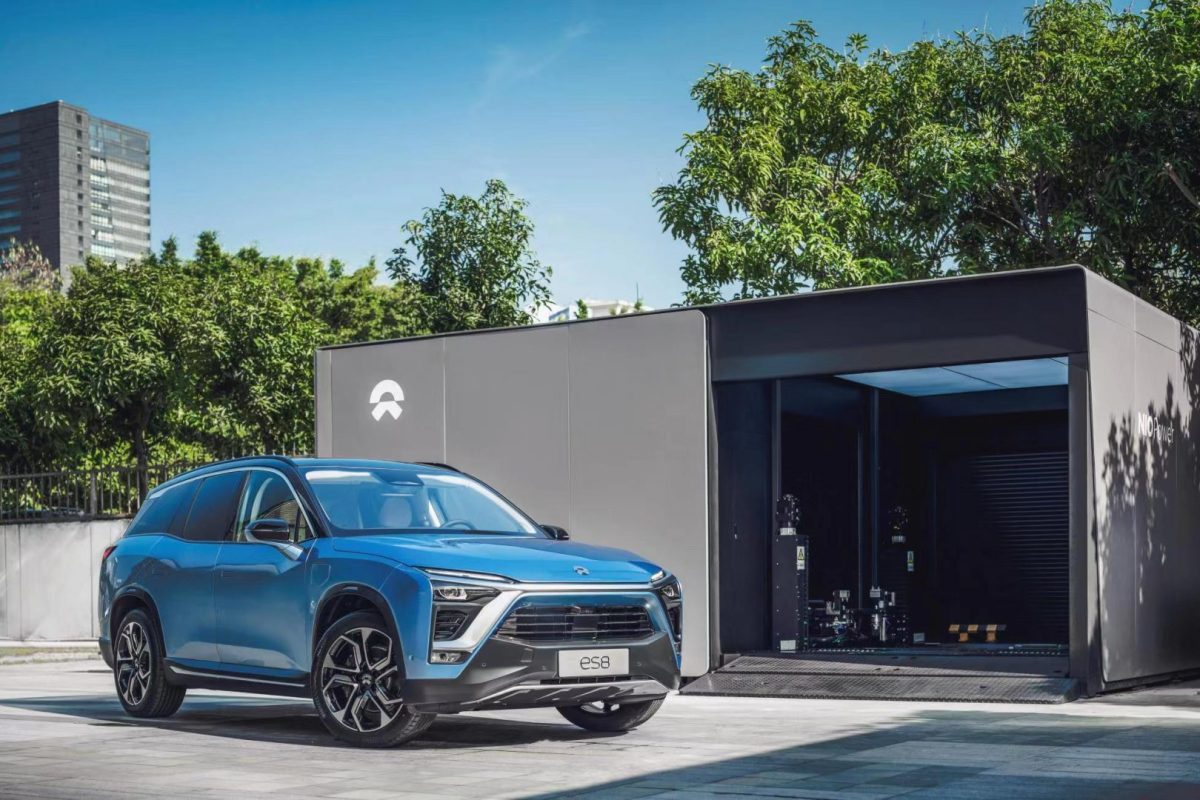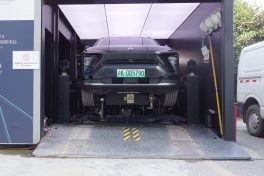For years, batteries have been a big turn off for prospective EV owners. They drive up the cost of the cars, making them more expensive than gas autos—and then these costly batteries wear out faster than the rest of the car, causing EVs to lose value faster than gas cars.
On top of that, they’re inconvenient. If you don’t have a special charging pile, it can take 12 hours to charge a car. And many car owners in China’s major cities don’t even have parking at home—let alone a private charging pile. Home charging installations are even strictly forbidden in some old, congested residential communities due to limited parking and power capacity.
Now, two Chinese companies believe they can sidestep these issues with a simple solution: instead of charging batteries, just change them. Think remote control, not iphone.
Other companies have tried before, but battery swap isn’t easy. Companies including Tesla have looked at the scale needed to make the system work, and given up. Automakers, battery suppliers, and service operators need to work together to standardize battery design and swap services.
Drive I/O
Drive I/O is TechNode’s monthly newsletter on the cutting edge of mobility: EVs, AVs, and the companies trying to build them. Available to TechNode Squared members.
BAIC, a legacy carmaker with a manufacturing partnership with Dailmer, went first. It says it’s the world’s first operator of a commercial battery swap service for taxi drivers, with a network of around 200 swap stations across China.
Meanwhile, Nio is trying a newly-legal model: consumer-facing Battery-as-a Service (BaaS). Under this model, the customer buys a car and then rents a battery to go with it. The company says it can slash the sticker price by a fifth for battery-less cars.
The two carmakers will have to overcome serious challenges—and deploy serious capital—to make the model work, but their swap efforts have one big advantage over previous attempts: support from China’s powerful EV regulators.
Advantages
In theory, battery swap addresses the biggest problems with EVs:
- Affordability: A battery can account for a fifth of a car’s price, and it loses value quickly—so separating cars and batteries cuts upfront cost and depreciation. This is especially important in China, where the government aims to completely eliminate EV subsidies after 2022.
- Convenience: While charging from the mains can take hours—or 40 minutes if you can find a Supercharger—a swap takes minutes (if you can find a free swap station). Much better for road trips, poor advance planners, or professional drivers who need their car on the road all day.
- Safety: China also expects swaps to improve safety and help reduce car fire accidents, as companies will have a chance to check batteries for faults regularly when they come in for swaps.
Skeptics
Despite its advantages, many industry analysts doubt that a battery swap service can work at scale. Companies that have attempted to launch battery swap initiatives in the past have failed dismally.
Tesla quietly closed its pilot project three years after opening its only battery swap station in 2013. Meanwhile, Israeli startup Better Place filed for bankruptcy in 2013, partly due to its ambitious plan to build a nationwide chain of expensive pit stops.
- Cash burn: Nio, like other Chinese EV makers, is already in the red. Building a network of battery swap stations in China could further worsen the company’s financial situation. Each of Nio’s 143 battery swap stations costs more than RMB 2 million to set up, according to the company. As the service has long been free for Nio’s customers, they’re not bringing in any offsetting revenue yet.
- Nio CEO William Li said recently that the production cost of a battery swap station would be cut down to half next year owing to design improvements. The EV maker will also limit new owners to six free swaps a month from Oct. 11.
- Standardization: Every company uses its own model of battery—so a Nio swap station can only swap Nio batteries. Would you buy a gas car if you could only fill the tank at Shell stations?
- User concerns: Some Nio users complain that the company’s battery rental offerings are too expensive. The company charges a monthly fee of RMB 980 ($143) for a 70 kWh battery pack.
- Other users posting in Nio forums worry that the swap stations will replace the new battery that came with the car with an older battery.
Some of these problems could be easier for fleet-focused companies like BAIC. Scale, and standardization are easier to achieve for taxis, because they deploy thousands of the same car at once.
Government to the rescue
Since 2009, China has aimed to be at the forefront of global EV adoption. Slowing sales after the government cut purchase subsidies last year and concerns over the range of existing EVs has led Beijing to get interested in battery swap.
The government has pushed an array of policy changes to support battery swap, likely hoping it will help to sell EVs after the country reported its first-ever annual decline in new energy vehicle sales last year.
Legalizing battery-free cars: By far the biggest policy development is a change in regulations allowing EV makers to sell cars without batteries, reversing an eight-year-old rule that required NEVs to come with a battery. This move allows Nio, the only adopter so far, to slash sticker prices.
Incentives: The government also stepped up its support for battery swap initiatives by offering favorable treatment for EVs with swappable batteries. In April, Beijing cut NEV subsidies by 10%, while premium models priced RMB 300,000 and above have also been excluded from a two-year tax exemption and purchase subsidies. However, cars whose batteries can be replaced were exempted, giving them a price advantage.
- Government subsidies are also being used to build battery swap infrastructure, although in most cases the rules are unclear and vary among cities. A battery swap station in the southwestern Chinese city of Chengdu, for example, could earn as much as RMB 5 million in subsidies, according to a Chinese media report. In the central Chinese city of Wuhan, the government has offered subsidies of up to RMB 3 million per swap station.
On equal footing: But the central government stressed in July 2019 that it’s not against non-swappable EVs. Chinese media Caixin reported that there isn’t a plan to force battery swapping, and that the government plans to let the market make the choice, citing MIIT deputy director Luo Junjie.
The players
Nio takes the consumer market: Nio was the first Chinese company to risk a consumer-facing battery swap business. The EV maker in August drastically revamped its service by allowing users to buy a vehicle without a battery, dramatically reducing costs.
Consumers who buy a Nio ES6 crossover, with an original price of RMB 358,000 and above, now get a 20% discount (around RMB 70,000) if they forego owning a battery and subscribe to Nio’s battery rental service.
- Nio owners currently pay a minimum fee of RMB 980 per month for the leasing program, but there is room for further reduction due to falling battery costs, investment bank China International Capital Corporation (CICC) said last month (in Chinese).
- Nio is sharing the risks of the battery swap business with partners: last month, it formed a battery asset management company with Chinese battery giant CATL, financial services group Guotai Junan International, and state-owned Hubei Science Technology Investment Group. Each stakeholder owns 25% of the joint venture.
See it in action
TechNode visited a Nio battery swap station in Shanghai and spoke with Nio owners—read the accompanying story for their comments on the service and a short video of battery swap in action.
Nio’s battery swap stations appear to be relatively popular. During a visit to one of these stations in Shanghai, TechNode saw five batteries changed in 40 minutes. Three Nio owners at the facility said that they use the service at least five times a month, with one adding that they save him up to RMB 10,000 a year in electricity.
BJEV, the EV unit of BAIC, was the first big player in swap. With a strong presence in the commercial fleet segment, BJEV currently runs a network of 187 battery swap stations in 19 cities around China for its fleet of 18,000 taxis. The company plans to invest RMB 1.2 billion to build 82 new battery swap stations, while looking for partners for further expansion, according to a private placement plan (in Chinese) released last month.
- It also seeks to establish itself in the premium market, with plans to roll out the first mass production EV under its new Arcfox brand this month. There have been rumors that the Arcfox α-T crossover will be equipped with swappable batteries with a reported starting price of around RMB 280,000, targeting Tesla vehicles.
Rest of the pack: China’s biggest automaker SAIC jumped into the market following policy changes, with plans to launch two EV models with swappable batteries for the first time, according to a document released by the MIIT on Aug. 25. Meanwhile, Volvo parent company Geely registered a new trademark for battery swap services in April, and is on track to release an EV model with a replaceable battery later this year.
What’s next?
Beijing doesn’t see swaps as a replacement for charge batteries. Rather, battery swap is poised to act as a stopgap in China’s transition from gas-driven cars to green transportation.
Nio sees battery swapping as complementary to charging, assuming that swap users will also regularly charge their batteries. Each swap station contains only five batteries, said Nio’s William Li during a media briefing in August. Currently, 60% of Nio owners have used the company’s battery replacement services, of whom half swap packs twice per month, and the other half more than twice a month, Li added.
But the company hopes swap will bring in customers who don’t have good access to chargers at home, and reduce losses. CICC analysts say the initiative will narrow the company’s annual loss by RMB 130 million to RMB 4.4 billion over the next year by increasing sales and bringing in revenue by selling battery packs to its joint venture with CATL.
Recycling profits: Meanwhile, both BJEV and Nio have designs to leverage battery swap into a much larger market: energy storage for the national grid.
Providing services will leave both companies with a pile of worn-out batteries—most are retired from car use when they can hold only 80% of their original charge. These 80% batteries are still valuable in an application where you don’t care much about charge per weight—say, providing energy storage to solar farms. Providing reserve energy capacity for public usage with recycled batteries would be more cost-effective and create a second revenue stream with the ownership of used batteries, consultancy McKinsey wrote last year.
A BJEV executive reportedly estimates to expand this emerging business as early as next year, when the first batch of EV batteries on Chinese roads are about to retire. The legacy automaker has deployed a taxi fleet of over 18,000 EVs with swappable batteries in nearly 20 Chinese domestic cities as of May and plans to sell 30,000 more by the end of this year, a company executive told Chinese media.
A big bet: Battery swapping might not be consumers’ first choice for the next several years. But the business is starting to boom as the government jumps behind the technology. For local players, battery swap could be a cash strain for a long time to come, but the technology also paves the way for China’s rebound in EV uptake.
Correction/update: An earlier version of this article, sent as an e-mail, newsletter inaccurately reported BJEV and Nio’s relative sales of swappable EVs and the release date of Nio’s battery rental offering. The article was also updated on Sept. 3 to include comment from Nio on its battery swap business.


